Renowned Expert Prof. Anna Förster Enlightens University of Moratuwa on Sustainable Communication Networks
Prof. Anna Förster, a distinguished researcher from COMNETS, University of Bremen, Germany, graced the halls of the University of Moratuwa on Wednesday, February 7th, 2024, captivating attendees with her insights into Sustainable Communication Networks and postgraduate study prospects in Germany.

Addressing an audience in the Electronic and Telecommunications department, Dr. Förster delved into her pioneering research, which focuses on self-organizing and autonomous sensor networks, opportunistic networks, and underground sensor networks. Utilizing a blend of artificial intelligence techniques such as machine learning and swarm intelligence, she sheds light on various aspects of wireless communication protocols and applications.
One of the highlights of Dr. Förster’s research is its practical applications, aimed at contributing to the global achievement of Sustainable Development Goals. These applications span decision agriculture, environmental monitoring, safety monitoring, health applications, and more. Additionally, her work emphasizes the usability of Internet of Things (IoT) applications to maximize their impact and utility.
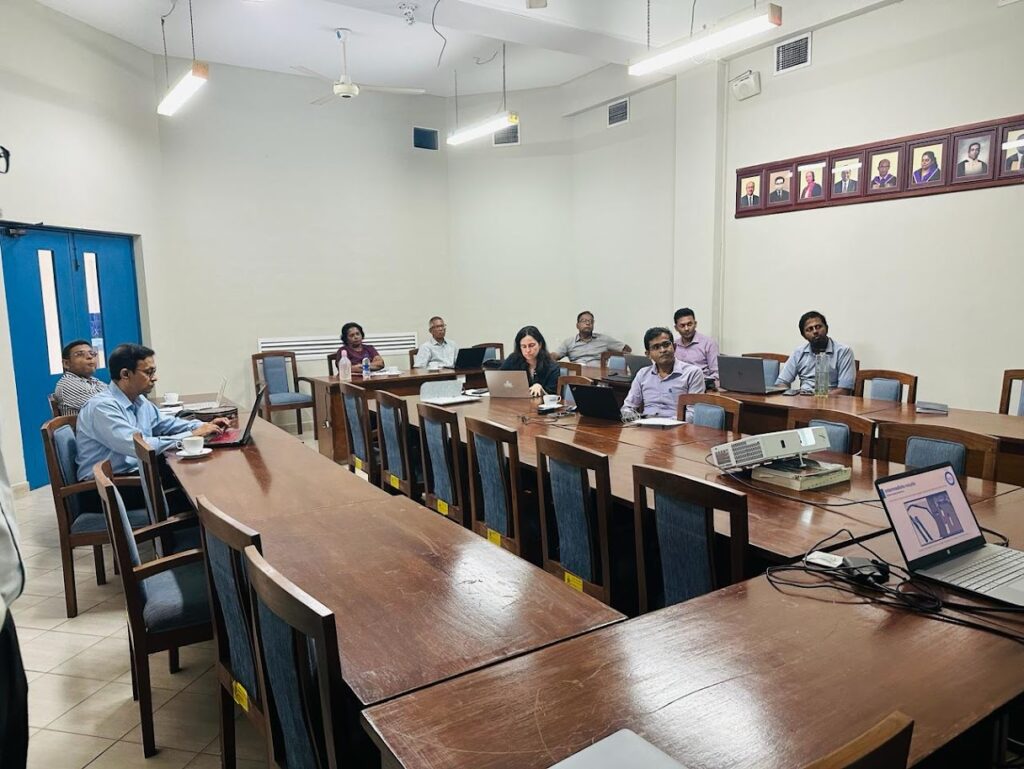
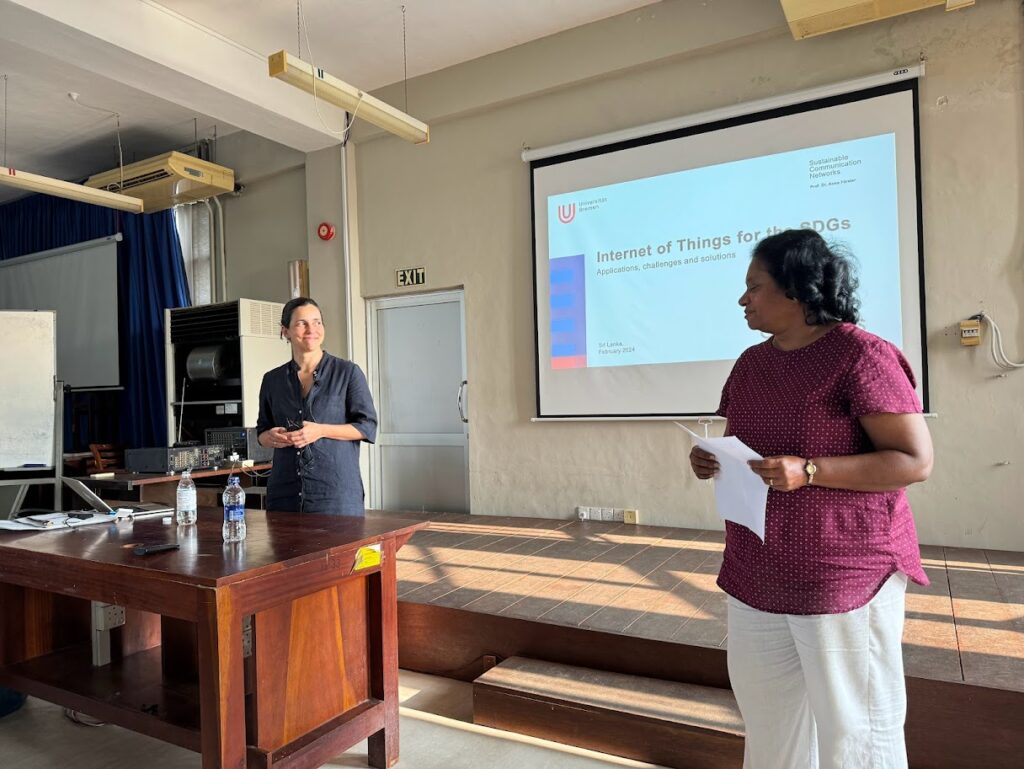
During her visit to the University of Moratuwa, Dr. Förster engaged in multifaceted activities, including providing feedback on final-year project mid-evaluations and delivering illuminating talks on her research on sustainability and IoT. Furthermore, she shared invaluable insights into studying in German universities, offering aspiring scholars a glimpse into the educational opportunities available in her home country.
Read MoreWorkshop on Quantum Computing
The Electronic and Telecommunication Engineering Department of the University of Moratuwa, in collaboration with the UBC Quantum Club, IEEE Sri Lanka Section, and Skill Surf, organized a one-day workshop on “Introduction to Quantum Computing” on January 21, 2023. The workshop aimed to introduce participants to the basics of quantum computing, its applications, and its future potential. The workshop featured key resource personnel who are experts in the field of quantum computing. Dr. Harini Hapuarachchi from RMIT University, Australia, Mr. Kithmin Wickremasinghe from the University of British Colombia, Canada, Mr. Ravi Tharaka from Monash University, Australia, and Theshani Nuradha from Cornell University, USA, were the keynote speakers for the workshop.
The one-day workshop attracted a significant number of participants, including students, academics, and industry professionals. The workshop offered a comprehensive introduction to the basics of quantum computing, including quantum mechanics, qubits, quantum gates, quantum circuits, and quantum algorithms. Participants also had the opportunity to learn about quantum computing applications in various fields, including cryptography, machine learning, and optimization. The workshop included interactive sessions, demonstrations, and hands-on exercises to provide a practical understanding of the concepts covered in the lectures. The resource personnel also provided valuable insights into the future of quantum computing and the opportunities it presents.
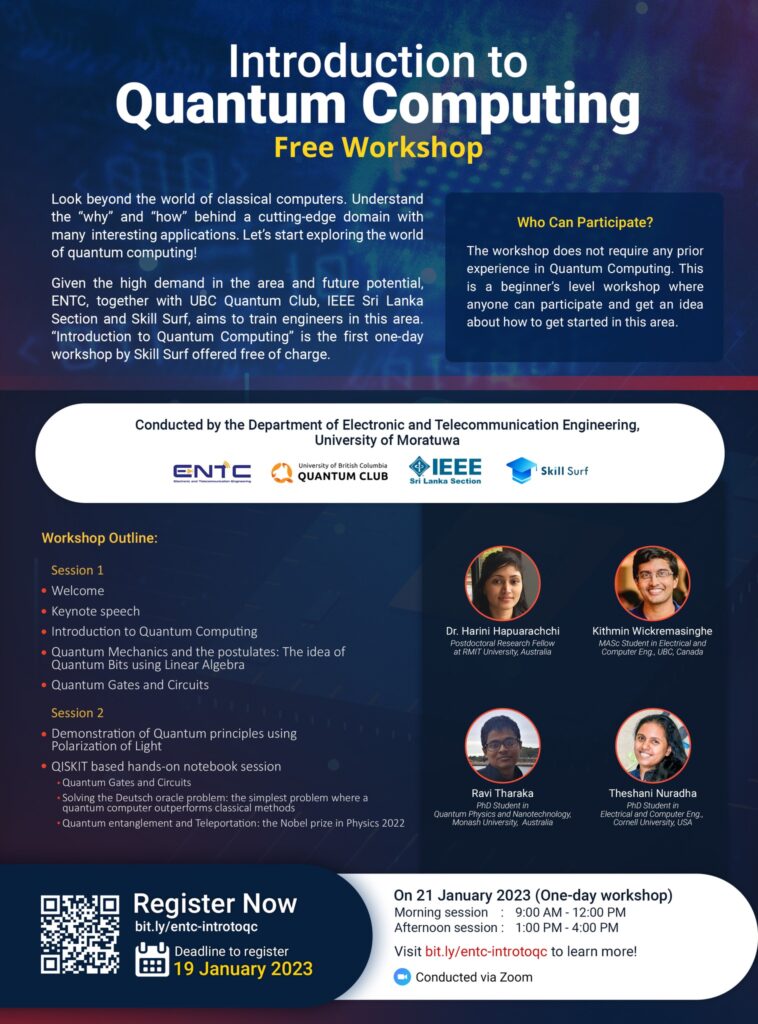
The workshop was a great success, with participants expressing their satisfaction with the content and delivery of the program. The participants also had the opportunity to network and exchange ideas with the experts in the field. The organizers of the workshop thanked the resource personnel, participants, and sponsors for making the event a success. They also encouraged participants to continue to explore the world of quantum computing and stay updated with the latest developments in the field.
Overall, the “Introduction to Quantum Computing” workshop was a great initiative by the Electronic and Telecommunication Engineering Department of the University of Moratuwa, together with its partners. The department has a thrust area in quantum computing. The workshop was an excellent opportunity for participants to expand their knowledge and skills in quantum computing and explore the exciting potential of this emerging field.
Read MoreTeam CircuitBreakers of ENTC Wins the IEEE Region 10 Robotics Competition
The Department of Electronic and Telecommunication Engineering at the University of Moratuwa is proud to announce the success of Team CircuitBreakers at the IEEE Region 10 Robotics Competition. The competition, which was held on 17 and 18 December 2022 at the Faculty of Engineering at Chulalongkorn University in Bangkok, Thailand, focused on the theme of “Robotics for Healthcare.”
Team CircuitBreakers, which consists of Shalutha Rajapakshe, Dilanka Wickramasinghe, Sahan Gurusinghe, and Deepana Ishtaweera, was mentored by Mr. Bhanuka Silva and supervised by Dr. Peshala Jayasekara. The team developed a collaborative quadcopter and hexapod robot system for disaster response missions, in which the quadcopter surveys and maps out the disaster environment while detecting victims, and the ground hexapod robot autonomously navigates to deliver medical packs and teleconference with victims.
The project was self-funded, with additional support from CSIRO Data 61 in Australia. Team CircuitBreakers emerged as the winner of the competition, beating out other teams from across the region.
The main objective of the competition was to raise awareness among young IEEE members about the importance of technology in providing solutions to real-world problems and to encourage creativity and innovation. Team CircuitBreakers’ groundbreaking project exemplifies this goal, using cutting-edge robotics technology to address the critical issue of disaster response.
The Department of Electronic and Telecommunication Engineering at the University of Moratuwa is proud of Team CircuitBreakers’ achievement and looks forward to seeing their continued success in the field of robotics.
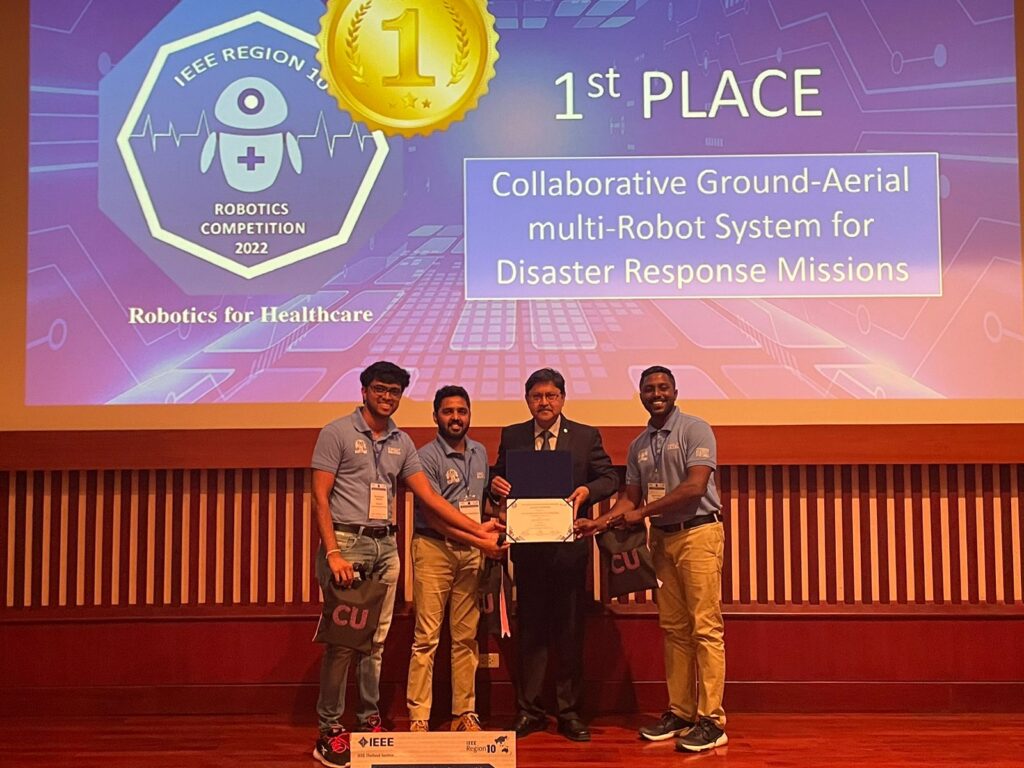
Multi-Label Reduced-Lead EEG Classification Using CNNs
Nima Wickramasinghe from the Department of Electronic and Telecommunication Engineering (ENTC), together with his mentor Mohamed Athif from the Department of Biomedical Engineering, Boston University (previously an undergraduate at ENTC) have written a research paper, titled “Multi-label Classification of Reduced-lead ECGs using an Interpretable Deep Convolutional Neural Network” which has been accepted to be published in the journal Physiological Measurement as a special issue paper.
In their work, they propose a novel method to identify the presence of 26 cardiac abnormalities in an ECG recording with reduced leads. Even though most of the previous work relies on 12-lead ECGs, classification using reduced leads remained unexplored. In their research, they trained a deep convolutional neural network to classify the ECG recordings and showed that the reduced-lead model performs comparably to the 12-lead model. In addition to accurately classifying the cardiac abnormalities, they have used SHAP (shapley additive explanations: a game-theoretic approach used to explain the output of any machine learning model) to interpret the deep learning model. The authors identified that the model learns almost the same diagnostic criteria used by cardiologists to classify cardiac abnormalities. By analyzing the model through SHAP, they were able to detect why the model underperforms in some of the classes, which was mainly due to the lack of discriminating features in reduced leads, labeling inconsistencies in the dataset, and low number of samples.
Physiological Measurement is a journal that covers the quantitative measurement and visualization of physiological structure and function in clinical research and practice, with an emphasis on the development of new methods of measurement and their validation. The Sustainable Education Foundation facilitated the collaboration between the 2 authors.
DOI Link to the paper: https://doi.org/10.1088/1361-6579/ac73d5
Read MoreMr. Pasan Dissanayake and Dr. Prathapasinghe Dharmawansa of ENTC have Published Two Research Papers in the Prestigious Journal IEEE Transactions on Information Theory
Two research papers written by Mr. Pasan Dissanayake and Dr. Prathapasinghe Dharmawansa of ENTC have been published in the prestigious journal IEEE Transactions on Information Theory. IEEE Transactions on Information Theory is the world’s No. 1 journal in the areas of Information and Communication theory research. This truly exceptional achievement will make the research history of ENTC. This extraordinary academic achievement will be a guiding spirit for the current and future researchers in the entire university system of Sri Lanka. Moreover, it will help place ENTC among the top researchers in information and communication theory in the world. The details of the two papers are as follows.
1. Distribution of the Scaled Condition Number of Single-spiked Complex Wishart Matrices
This paper statistically characterizes the scaled condition number (SCN) of single-spiked complex Wishart matrices by deriving its density function. The statistical characteristics of the SCN and its variants have been instrumental in understanding many physical phenomena across a heterogeneous field of sciences. While numerical analysts and statistical physicists are interested in the behavior of the SCN for white Wishart matrices, the case corresponding to correlated Wishart matrices are of paramount importance in wireless communications and statistics. In particular, the SCN has been used as a performance metric in certain wireless signal processing applications involving multiple-input multiple-output (MIMO) systems, in which the antenna correlation gives rise to the correlated Wishart matrix. Recently, the SCN has been proposed as one of the test statistics for blind spectrum sensing in cognitive radio (CR) systems. The key concept behind CR is to opportunistically utilize the underutilized spectrum in view of improving the spectral efficiency of modern wireless networks. Against this backdrop, this paper leverages powerful random matrix theoretic techniques and the novel density of the SCN to statistically characterize the receiver operating characteristics (i.e., ROC) of the aforementioned detector. Since the modern wireless architectures facilitate the use of large antenna/sensor arrays with comparable observational sample acquisition, the analysis has been extended to the asymptotic regime in which the number of antennas of the detector and the samples diverge at the same rate so that their ratio remains constant. It turns out that, in this asymptotic regime, the statistical power of the SCN based detector can be approximated by the most celebrated Tracy-Widom distribution corresponding to the complex matrices. Moreover, numerical results have revealed that those asymptotic results compare favourably with their not so large dimensional counterparts.
2. The Eigenvectors of Single-spiked Complex Wishart Matrices: Finite and Asymptotic Analyses
This paper investigates the finite dimensional distributions of the eigenvectors corresponding to the extreme eigenvalues (i.e., the minimum and the maximum) of single-spiked complex Wishart matrices. These spikes arise in various practical settings in different scientific disciplines. For instance, they correspond to the first few dominant factors in factor models arising in financial economics, the number of clusters in gene expression data, and the number of signals in detection and estimation theory. In particular, the focus is on the distributions of the squared modulus of the eigen-projectors (i.e., projection of the spiked-vector onto the leading and least eigenvectors) of single-spiked Wishart matrices. This metric is commonly used to infer information about the latent spiked-vector using the eigenvectors of the sample covariance matrix. A concrete example in this respect is the principal component analysis (PCA) in which the eigenvectors of the unknown population covariance matrix is approximated by the eigenvectors of the sample covariance matrix. This metric has further been used in the covariance estimation based on the optimal shrinkage of the eigenvalues of the sample covariance matrix in the high dimensional setting when the unobserved population covariance matrix assumes the spiked structure. This paper leverages the powerful contour integral representation of unitary integrals and orthogonal polynomial techniques to derive closed-form expressions for the densities of the above metrics. A somewhat surprising stochastic convergence result pertaining to the above metrics has also been established. Finally, the same analytical framework has been extended to derive the corresponding destines for real and singular Wishart scenarios; however, with closed-form solutions limited to a few special configurations only.
Research paper acceptance at IEEE/CVF WACV 2022
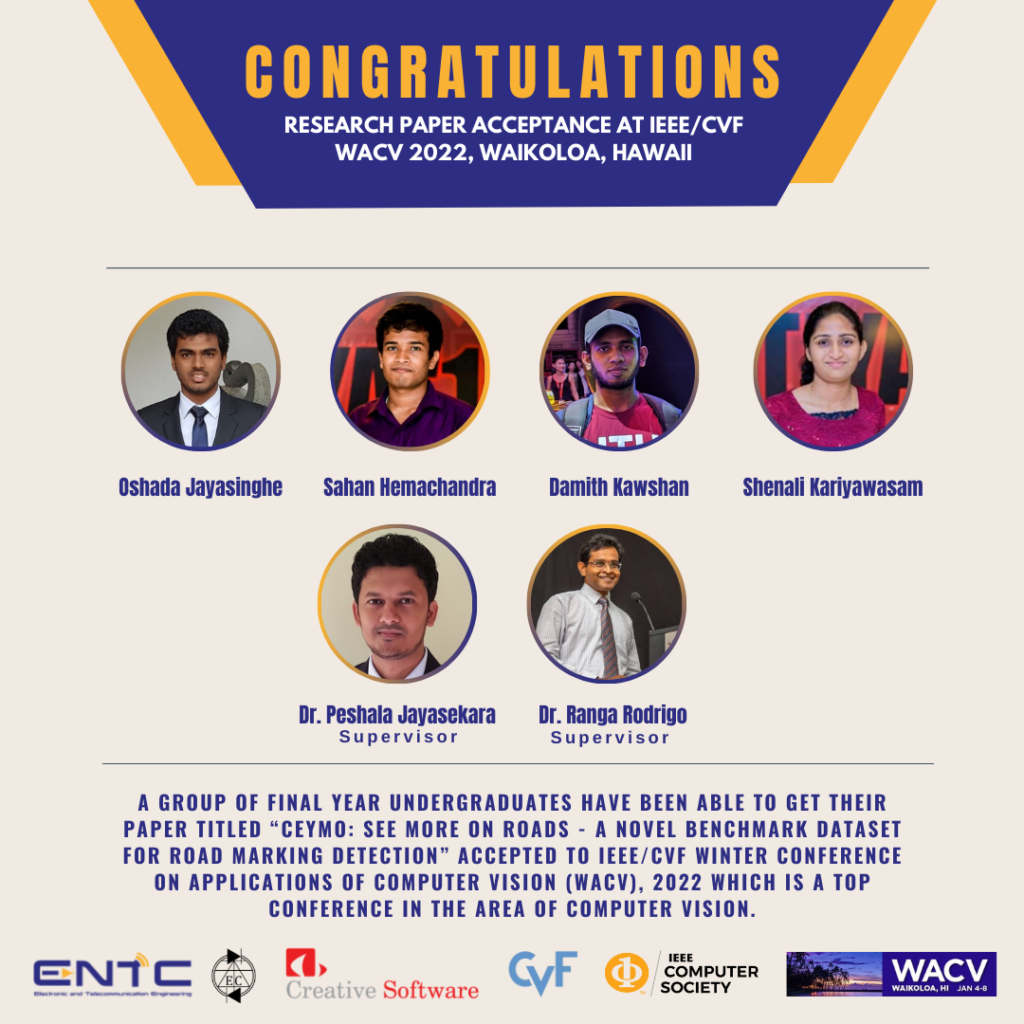
A research paper titled “CeyMo: See More on Roads – A Novel Benchmark Dataset for Road Marking Detection” has been accepted to the IEEE/CVF Winter Conference on Applications of Computer Vision (WACV), 2022. The research was conducted by Oshada Jayasinghe, Sahan Hemachandra, Damith Anhettigama, and Shenali Kariyawasam under the supervision of Dr. Peshala Jayasekara and Dr. Ranga Rodrigo.
The paper introduces a novel road marking benchmark dataset for road marking detection in advanced driver assistance systems and autonomous vehicles. Though understanding road markings is a fundamental perception task in autonomous vehicles, the development of robust road marking detection algorithms has been a challenging task in the research community due to diverse road, illumination, and traffic scenarios. The introduced dataset covers a wide variety of urban, sub-urban, and rural road scenarios with diverse illumination and weather conditions. The multiple annotation formats and the clear evaluation metrics with the evaluation script will promote novel road marking detection algorithms and direct comparison of them. Furthermore, the authors evaluate the approaches of utilizing instance segmentation-based and object detection-based neural network architectures for the road marking detection task, which will facilitate future research on road marking detection in challenging environments.
WACV is a top international conference in the field of computer vision and pattern recognition organized annually by the IEEE Computer Society and the Computer Vision Foundation. WACV 2022 will be held from 4th to 8th of January 2022 in Waikoloa, Hawaii, USA. This research was carried out as a final year project at the Department of Electronic and Telecommunication Engineering (ENTC), University of Moratuwa in collaboration with Creative Software Pvt. Ltd.
UOM Emerged as the Champions of the Students Challenge in the ICAS 2021 Conference
Team DigitX, a team of ten undergraduates from the Department of Electronic and Telecommunication Engineering (ENTC) under the supervision of Dr. Chamira Edussooriya from ENTC, University of Moratuwa, emerged as the champions of the Students Challenge at the Internal Conference on Autonomous Systems (ICAS) 2021 conference. The conference was held virtually in Montreal, Canada from August 11 to 13, 2021.
ICAS 2021 is the premier international forum organized by the IEEE Signal Processing Society (SPS) through IEEE SPS Autonomous Systems Initiative, for presenting the technological advances and research results in the fields of theoretical, experimental and applied autonomous systems. IEEE ICAS was held for the first time this year and it focused on providing an updated state-of-the-art over advanced signal processing theories and techniques that are relevant for developing autonomous systems.
The ICAS 2021 Students Challenge was on “unsupervised anomaly detection through self-aware autonomous systems”, to detect abnormal events during the navigation of a ground/ aerial vehicle. The team was able to develop an unsupervised learning algorithm with state-of the-art signal processing and machine learning techniques such as auto-encoders, recurrent neural networks for time-series data signal processing.
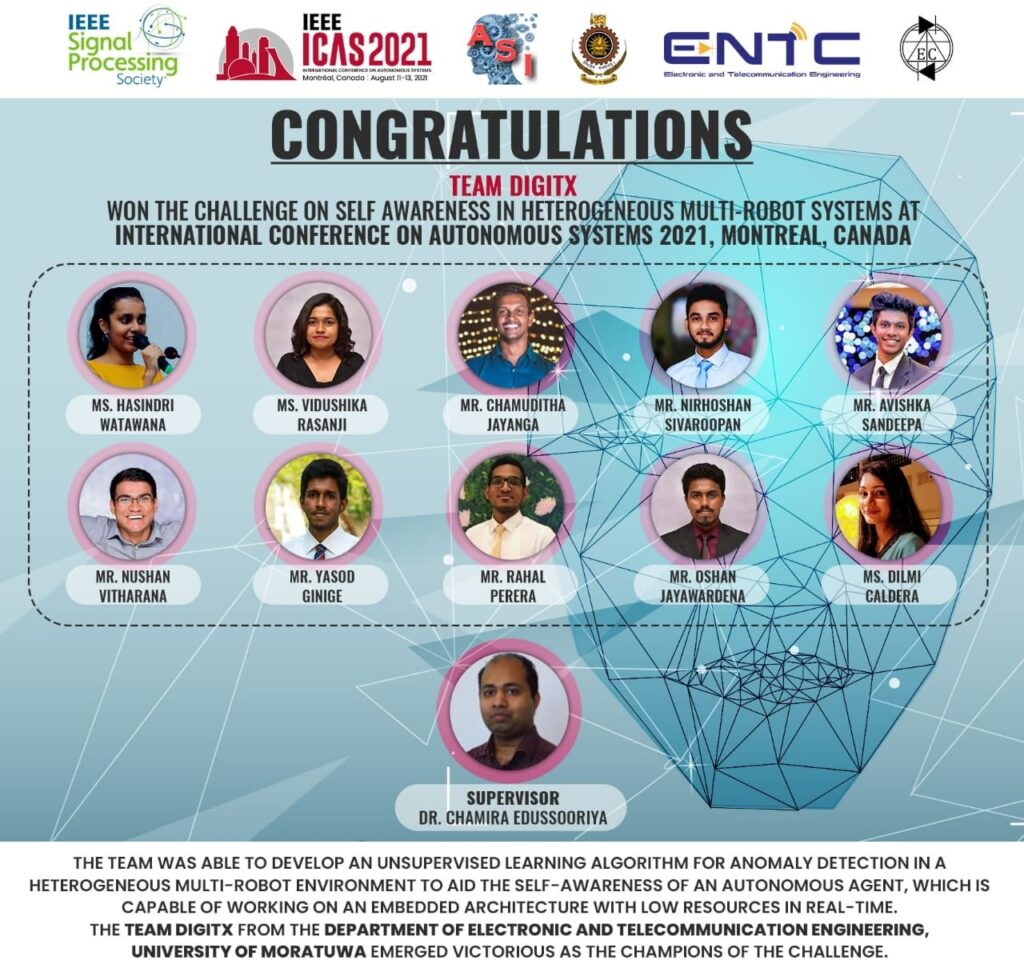
Based on the inertial measurement unit (IMU) sensor data, video data captured by the cameras of autonomous systems in several camera perspectives and light detection and ranging (LIDAR) sensor data (point clouds), the unsupervised model was trained to identify the normal situations that it saw during the training phase as normal and every other situation as abnormal (as per the challenge requirement a reference normal scenario was defined for each dataset). UoM won the first place while a team from Indian Institute of Technology (IIT), India and a team from CentralSupelec, France won first and second runners up, respectively.
An autonomous system is an artificial system capable of performing a set of tasks with a high degree of autonomy. Developing computing systems with advanced levels of autonomy has been a crucial task for decades in order to manage ever-increasing requirements in complexity. This achievement by UoM places Sri Lanka at a higher position in the world signal processing community.
Read MoreResearch Paper Presentation at IEEE EMBC 2018
A research paper titled “Detection of Diabetes by Macrovascular Tortuosity of Superior Bulbar Conjunctiva” was presented at the 40th Annual International Conference of the IEEE Engineering in Medicine and Biology Society (EMBC) 2018 held in Honolulu, Hawaii, USA from July 17th to 21st. It was presented by Mr. Achintha Iroshan Kondarage and the manuscript was written by Mr. Achintha Iroshan Kondarage and Mr. Dulara De Zoysa. This Research was conducted under the supervision of Dr. Anjula De Silva, Dr. Nuwan Dayananda, Prof. Saroj Jayasinghe, Dr. Mahen Wijesuriya and Dr.Chamari Warnapura. This research was carried out with collaboration of three institutions, Department of Electronic and Telecommunication of University of Moratuwa, Department of Clinical Medicine of University of Colombo and The National Diabetes Center. Authors are focusing on implementation of computational methodologies to detect micro and macro vascular complexities. In this research work they have implemented several image processing algorithms and computational methodologies to compute tortuosity of blood vessels in bulbar conjunctiva using a 2D image of sclera region. They have also identified a significant relationship between diabetes and macro vascular tortuosity of bulbar conjunctiva.
EMBC is the annual flagship conference of the IEEE Engineering in Medicine and Biology Society, covering a broad range of topics from cutting edge biomedical and healthcare technology research and development to clinical applications, biomedical education and entrepreneurship. It is the world’s largest international biomedical engineering conference. This research was conducted as the final year research project of Mr. Achintha Iroshan Kondarage and Mr. Dulara De Zoysa under the Biomedical Engineering degree program at Electronic and Telecommunication Engineering department of University of Moratuwa.



CEBI hosts guest talk by delegates from QUT
On the 2nd of May 2018, a talk organized by the Center for Biomedical Innovation (CEBI) on biomedical engineering opportunities was held at the Electronics and Telecommunications Engineering (ENTC) department with delegates from the Queensland University of Technology, Australia. The delegation consisted of Professor Prasad Yarlagadda, Professor John Bell, and Dr. Kateryna Bazaka who were visiting the University of Moratuwa in a bid to strengthen ties between the two institutions. Prof. John Bell and Dr. Kateryna Bazaka spoke broadly about research at QUT and Prof. Prasad Yarlagadda gave a talk on the “study of natural bactericidal surface production on titanium implants for orthopedic applications” which is one of his research focuses. Furthermore, as QUT has a strong robotics group, the delegation also spent some time with Prof. Rohan Munasinghe at the UAV lab located in the ENTC department as well as with Prof. Ruwan Gopura at the Bionics lab located in the Mechanical Department.
CEBI, a multidisciplinary research center established by the University of Moratuwa is an initiative towards collaborative commercializable research in the area of biomedical device development. Dr. Pujitha Silva as the center director, Dr. Nuwan Dayananda, and Professor Ruwan Gopura as the HoD’s of ENTC and Mechanical respectively along with other senior biomedical lecturing staff members from ENTC, mechanical and other relevant departments play a pivotal role in the progress of this center. This visit has allowed for mutual insight to be obtained on the current research trends occurring both at QUT and at UoM and has created a path for future collaborative activities.
Read More
